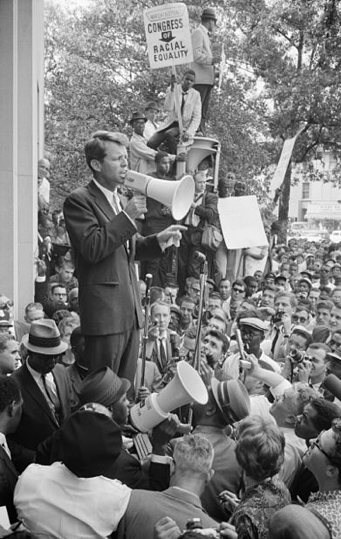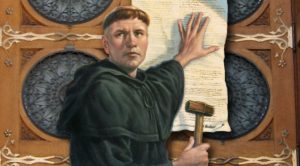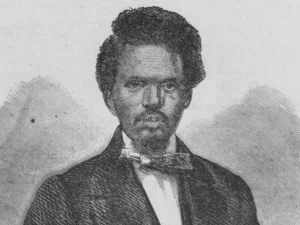On March 16, 1968, Robert F. Kennedy declared that he was running for president of the United States. Robert Kennedy was a humble man, stating that he was not running for president to oppose any man, but to propose new policies. With his brother leaving a big impact on so many, Robert F. Kennedy had big shoes to fill. The start of his pursuit for the presidency of the United States began when he became the 64th US Attorney General on January 21, 1961. On November 22, 1963, Robert lost his older brother, John F. Kennedy, after he was fatally shot in Dallas.1
After his brother had been killed, Robert Kennedy resigned as Attorney General less than a year later, in September of 1964. Wanting to do something different, Robert announced his intent to run for Senate. He successfully became the Senator of New York in 1965 and then began advocating for the poor, for human rights, and against racial discrimination. But he wondered to himself whether he should run for president or not.2 However, he wasn’t motivated to pursue the presidency because of many factors, one of them being his brother’s assassination.
Robert Kennedy was a prominent member of the Democratic Party. Kennedy had liberal views for what he thought would be better for the people of the United States. He thought that everyone should be treated equally and be treated like human beings. He wanted to desegregate schools, and wanted all people to enjoy the same rights. After waiting anxiously and not knowing whether he would run for the Democratic Party’s presidential campaign or not, he finally decided he would run for president, and his presidential campaign began in March 1968. He was prepared to take a risk in order to accomplish what he wanted and what he believed in.3 Something inside of him wanted to make a difference and change America for the better. He was actually a late entry in the primary race for the Democratic Party’s presidential nomination.
Kennedy focused on the issues of social improvement, economic justice, and racial equality. The Democratic Party supported Robert F. Kennedy and they helped him launch his presidential campaign. On March 16, 1968, Robert Kennedy’s presidential campaign began, even before Lyndon B. Johnson announced he wouldn’t run for re-election. He was willing to challenge Johnson for the nomination, which was clearly a risk.

Robert Kennedy gave his first campaign speech at Kansas State University, where he drew a record crowd. In his speech, he spoke out about ending the Vietnam war, then he continued on to the matter of poverty, emphasizing the horror he felt when he saw what poor Americans had to face every day. Towards the end of his speech, he quoted George Bernard Shaw: “Some people see things as they are and say, why? I dream things that never were and say, why not.”4 This quote would become the centerpiece of Kennedy’s presidential campaign and help express the mindset he had about what he wanted to do if he became president. He wanted to create things and change things.
Youth engagement was critical for his campaign. He tried to inspire young leaders, and he created a national resource center for juvenile justice, by giving opportunity to juveniles to do more with their lives. His political platform was structured around racial equality and economic justice. He supported non-aggression in foreign policy, and social improvement for the poor and for people who were segregated.5 Robert F. Kennedy wanted to desegregate schools and wanted every American to have the same rights as every other American. He even spoke to civil rights activist Cesar Chavez, who was just ending a 25-day hunger strike over the treatment that farm workers were enduring.
On March 31, Lyndon B. Johnson stunned the nation by dropping out of the presidential race. At that time there were only fourteen states that held primary elections: California, Florida, Illinois, Indiana, Massachusetts, Nebraska, New Hampshire, New Jersey, Ohio, Oregon, Pennsylvania, South Dakota, Wisconsin and West Virginia. Robert Kennedy had won two primary states: Indiana and Nebraska. When Martin Luther King Jr was shot, on April 4, 1968, Kennedy gave an improvised speech in Indianapolis, Indiana, speaking at two universities. He then boarded a plane to attend campaign rallies, honoring the death Martin Luther King Jr emphasizing his love for life and justice for the people. Robert Kennedy began addressing the people, asking them whether the nation would choose to continue to be segregated and fall apart, or whether it would move together as a country to achieve more. King’s death was an important moment that made many people see that a change was needed.6 Kennedy was behind Hubert Humphrey, Johnson’s Vice President, who had entered the race after LBJ declined to run. At the time, Humphrey was seemed to have an advantage over Kennedy in delegate support, but a victory in California’s primary could turn the tide in Kennedy’s favor.

Things were beginning to look good for Robert F. Kennedy. Then, suddenly, things took a stunning turn for the worst.
On June 5, 1968, presidential candidate Robert F. Kennedy was at the Ambassador Hotel in Los Angeles. It was the evening of the California primary, and the results were just coming in that Kennedy had won both South Dakota and California. He gave a triumphant victory speech, speaking to journalists and campaign workers and supporters. The speech was carried live on television. His victories in the California and South Dakota primary elections gave Kennedy the boost he needed to go into the Democratic Party Convention that summer with confidence that he would win the Democratic nomination for President of the United States. After leaving the podium and exiting through a crowded kitchen hallway, he began to have a conversation with a busboy named Juan Romero. Juan Romero was very grateful that a simple busboy like himself was able to interact with the potential president of the United States. But in the blink of an eye, while shaking the hand of Juan, Robert Kennedy came face to face with a 24-year-old Palestinian immigrant named Sirhan Sirhan. Sirhan suddenly shot Kennedy multiple times with a .22 caliber revolver. Kennedy’s body immediately dropped to the floor and everyone was in shock. Kennedy was later transferred to the Good Samaritan Hospital, where he was pronounced dead the following day.7
After Kennedy’s death, Juan Romero said, “This made me realize that no matter how much hope you have, it can be taken away in a second.”8 Kennedy’s remains were then flown back to St. Patrick’s Cathedral in New York for public viewing before a funeral mass. Thousands of mourners attended in order to see Robert Kennedy’s lifeless body. His blood-stained shirt, tie, and jacket are now in the possession of the Los Angeles County District attorney. Kennedy was then buried near his older brother John Kennedy, in Arlington National Cemetery.
It was later revealed during a search of Sirhan’s home that he held strong anti-Zionist beliefs and, in a diary, he wrote that he was determined to kill Robert Kennedy before June 5, 1968, because that was the first anniversary of the start of the Six-Day War between Israel and its Arab neighbors, and he resented Kennedy and his beliefs. He just held an overpowering hatred for Kennedy. He expressed that hatred toward Kennedy when he found out that Kennedy supported Israel and his attempt to send fifty bombers to Israel to harm the Palestinians. Sirhan was sentenced to death, but it was later commuted to life in prison.9

Later on, as the 1968 election progressed, Richard Nixon won the presidential election. Many believe Kennedy would have ultimately secured his nomination after successfully winning the California primary, were it not for his tragic death; and that he would have gone on to be elected president.10
After Kennedy’s death, things turned into chaos for the Democrats. The Democratic National Convention was held in Chicago in August. The purpose was to select a new presidential nominee to run as the Democratic party’s candidate for office. The Democratic Party ended up choosing Humphrey to run. But the way he was chosen was anything but civil. Party members and the Left were left devastated and demoralized in the wake of Kennedy’s death. Chicago was chaotic, both inside the convention hall and outside on the streets. One can only wonder how it all would have gone, had Kennedy lived.
- Robert F. Kennedy (John F. Kennedy Presidential Library and Museum), May 20, 2017. Accessed August 30, 2018. ↵
- Thurston Clarke, The Last Campaign : Robert F. Kennedy and 82 Days That Inspired America (New York : Henry Holt, 2009, 37-46. ↵
- Diane Nixon, “The Case of the Robert F. Kennedy Assassination Investigation Files,” The Public Historian (2008): 11, 29-35. ↵
- Ray E. Boomhower, Robert F. Kennedy and the 1968 Indiana Primary (Bloomington, Indiana University Press, 2008), 35-41. ↵
- Nora Rawlison and Robert F. Nardini, “Robert Kennedy,” Library Journal 113 (13) (1988): 156-162. ↵
- Micheal Rosenwald, “Robert F. Kennedy’s Remarks on the Assassination of Martin Luther King Jr,” The Journal of Blacks in Higher Education 55 (2007): 5. ↵
- Mel Alyom, Sirhan Sirhan and the Assassination of Robert F. Kennedy (Washington D.C.: 1st Ed Potomac Books, 2007), 60-67. ↵
- John Rogers and Russell Contreras, “Busboy Comforted a Dying Robert Kennedy,” Globe & Mail (Toronto, Canada 2018). ↵
- Ilene Cooper, The Assassination of Robert F. Kennedy (American Library Association / Booklist Publications), 44-50. ↵
- Kenneth Walsh, Shattering the Hope (U.S. News. June 1, 2017) Accessed September 9, 2018. ↵



67 comments
Todd Brauckmiller Jr.
It’s very sad to see that so much hate within someone will cause them to resort to such dangerous actions. History is my favorite subject and when looking back at the Civil Rights Area/Movement so many supporters of equality got pushed back so many times. The worst part is that you can’t fight fire with more fire, when Martin Luther and Kennedy were killed many people were filled with anger beyond words. Though with retaliation just causes more problems. When you give into the hate you become no better than the ones who caused it in the first place. It pains me to see how much harm was done in that era, just people trying to do the right thing and they end up getting killed for it. Great article, anything related to the Civil Rights Movement always catches my attention.
Sydney Hardeman
John F. Kennedy was one of my favorite presidents because of his character and beliefs. I did not know much about his brother, Robert F. Kennedy until reading this article and it just goes to show that the Kennedy family, believing in equality for all, and running their campaigns in an honest, ethical way, is a family that most definitely did not deserve the tragedies they endured. Nice article, it was very informative.
Shea Slusser
The Kennedy family cannot catch a break as it seems. The tragic death of John F. Kennedy was one of the most famous presidential assassinations. Further along the life of his younger brother Robert F. Kennedy, it seems he would have made a tremendous president and had plans for a bright future for our country. Unfortunately, the game of politics has its haters, therefore causing the death of the famous Robert F. Kennedy. I thought this was a captivating article and would recommend reading it.
Bianca-Rhae Jacquez
The Kennedy curse is one that is well known and much debated, but the pattern is just eerie. It seems as though that the Kennedy’s cannot catch a break. Not long after JFK was assassinated in Dallas, Robert, his brother decided to run for President, but never made it there. Sadly he was shot right after an amazing speech. This article was well written and described the events leading up to his death perfectly and clearly.
Tyler Reynolds
President John F. Kennedy was perhaps one of the greatest presidents we ever had. He proposed what many at the time called “radical policies” including a executive order to end the Federal Reserve. While I do appreciate the author’s take on the motivations behind Robert F. Kennedys death, I still believe there is a bigger picture that we have yet to see. The author did a good job explaining Robert F. Kennedy’s emotions, thoughts, and motivation, as well as his path to Presidency.
Nawaf Almarwaie
what happened to the Kennedy’s family it really break the heart, specially when we put in mind that what happened to John f. kennedy short before that. and if we look back to the 60’s we will see a lot of assassination attempts, and some of these attempts succeeded like what happened to Martin Luther King and his assassination. i still believe that what Kennedy’s family faced cannot be compared to any other political family
Ruben Basaldu
It is sad that this happened to the Kennedy family especially because they lost John F. Kennedy before they would eventually lose Robert. This was and still is a very tragic loss and I could only imagine what the Kennedy family must have been going through during this time. This was a great article on a topic that is heartbreaking and I really did enjoy reading this.
Eric Ortega Rodriguez
I know of Robert F. Kennedy before, however, I never really looked into him much. However, after reading this fascinating article it makes me want to look up more information about him and his brother. I find it completely bizarre how two siblings could have had the same fate. I believe that his plans for desegregation were good ideas but sadly he was not able to accomplish these task because of his assassination. Overall, good topic selection, especially since it is something more people need to know about. Great work.
Isaiah Torres
I’ve never had the same views as a Democrat. It wasn’t so much the visions they had but the things that they want to do to make them happen. I never knew the history of neither John Kennedy, or Robert Kennedy, and hearing the whole story on how Robert Kennedy was assassinated was interesting to hear about. I liked the details that the article went into, it even went deep enough to describe the name of who killed him as well as the weapon itself. Throughout this article, I had a picture in my head of everything while I was reading the whole time.
Rosario Moreno
Wow , that just made me overwhelmingly sad. So many deaths of people who didn’t deserve it. This was actually the first time of hearing of Robert Kennedy, which makes me sad,because he was such a great person. What i thought was so moving was that he knew that he could die like his older brother, but he wanted a better world.Could you imagine, if he didn’t die. If he became president and not Nixon. It really makes you thing, amazing article I loved it.